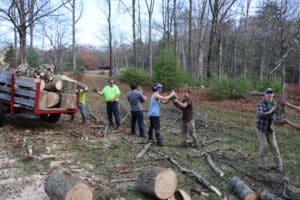Camper Discipline
-The importance of good discipline.
Discipline is training. It is encouraging a person to be an influence for good in our world. Discipline is a process of learning to do what is acceptable and best for everyone. It is not punishment for breaking rules. When we discipline ourselves and others, we train to do right. Discipline is not to a child, but for a child. It helps him learn to handle himself in his world.
Discipline in a camp setting tries to motivate campers to good behavior. That means getting them to want to behave well. This can be done through relationships with each other and with their counselors; and through their desire for new skills and experiences instead of with special favors, promises or bribes. As a counselor, your relationship with each camper will have a powerful influence on the way he (or she) thinks about himself, about older people, relationships, society, Christianity, and even God Himself. You are the child’s family away from home. Every act of discipline is a chance to encourage a child to be more like Jesus Christ.
When discipline is handled poorly, it can do tremendous damage. One parent said, “My son burst into tears at the end of camp and told me he wanted to run away because his counselor was ‘so mean’. He is soured on camp. The counselor apparently does not know that one week can poison a young mind towards the church and Christianity.”
Howard Hendricks tells a story about himself in fifth grade. His fifth grade teacher saw him only as a troublemaker –so much so that she sometimes tied him to a chair! He passed fifth grade only because she wanted to get rid of him. On the first day of sixth grade his teacher said to him, “I’ve heard an awful lot about you. But I don’t believe a word of it.” Howard says, “ I met the first person who believed in me.” He was a different person after that.
In working with campers it’s important to see a difficult child not as he is, but as he can become. Often a camper feels nervous at the beginning of camp, and may not be on his best behavior. You will need to guard against labeling people as troublemakers – don’t be bound by first impressions. It’s often been said, “if you tell a child often enough that he is stupid, he will soon begin to believe it.”
Campers are expected to treat counselors with respect, but this is a two-way street. Even troublesome children deserve respect. And respect builds relationships. That’s important. Campers are more responsive when they trust you. Remember that “please” and “thank you” go a long way toward building relationships.
Related Entries
Share:
Come and Pray Lunch & Retreat
Come and PrayPrayer Day with Lunch March 14, 9am-3pm~$30~ Overnight Prayer RetreatMarch 13-14includes March 14 Lunch~$120~ Come seek the Lord’s face with your faith family from all over the Tristate region for a relaxing time of prayer and discussion. We know God is doing amazing things — and he will continue to do more as…
Time to Pray
As followers of Jesus, he is our example in everything. When Camp says in our mission statement that we are “a community of Christ” – this is what we’re saying: we’re a group of people dedicated to the purpose of following and being like Jesus. So the question is, how do we follow Jesus as…
A Place of Prayer
Prayer — especially “vertical prayer” for specific God-revealed mission set apart from the concerns of our life and ministry — is a major theme for Camp in 2026. Maybe you read about this in the Winter Newsletter article “Time to Pray“? We want to extend the invitation to the entire Camp community and beyond —…
Living Abundantly Retreat
Jesus promised his followers an abundant life. Is that just an abstract idea to distract us from earthly misery, or is there real power in Christ to live a full and rich life in the here and now? Young adults are navigating a challenging landscape as they start “adulting” and building a life, so we’ll…
Forgiving Debts: 2025 Woodcutting Season
When Jesus taught his disciples to pray (Mt 6:9-15), he described two big realities where “thy Kingdom Come, thy will be done on Earth as it is in Heaven” are realized in the human world: First, he said “give us this day our daily bread”, acknowledging that God’s provision for human need is a central…
“How Do I Donate?”
Recently, a thirteen-year-old guest at Camp asked Operations Director Kevin Smith, “how do I donate?” Kevin was honestly a little surprised, but was happy to see this young member – who was on retreat with one of our owning churches — taking some initiative. Kevin directed him to the website Donate page, and the young…
The Discipleship Down-Low
Defining Discipleship 18 And Jesus came and said to them, “All authority in heaven and on earth has been given to me. 19 Go therefore and make disciples of all nations, baptizing them in the name of the Father and of the Son and of the Holy Spirit, 20 teaching them to observe all that I have commanded…
The Virtuous Wife
This past weekend, Camp hosted three women’s retreats at Camp. Though the retreat groups were very diverse in background – one was from an urban church plant in Philadelphia, one was from a Garifuna Mennonite church in Brooklyn (an Afro-Caribbean Culture), and one was from a multi-ethnic faith community reaching out in North Jersey. Though…
A Life of Service
I believe the most important thing to God is not our personality, knowledge, or talents, but our availability. How willing and ready are we to respond when He calls, and how ready are we to do what He says? What use to the Lord are people who could do what he wants with excellence and…
Building Belonging
At our February NYC LMC District meeting, we’re discussing the Belonging phase of The Journey Map. In this first phase on the map, individuals and groups on a spiritual journey begin the process of connecting to each other and evaluating the place they may have in each other’s lives. Have you ever been an outsider…



